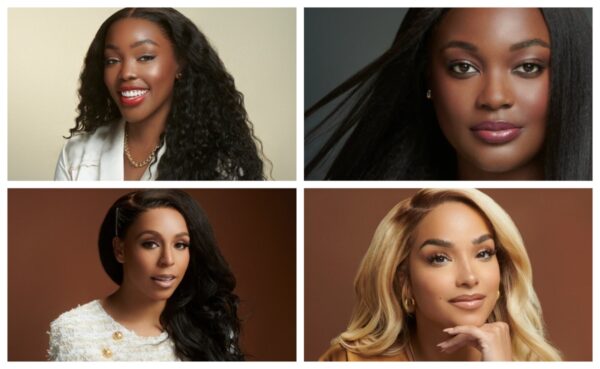A childhood hair trauma sparked a lifelong passion and a career for Isoken Igbinedion.
When she was 10 years old, chemical relaxers caused her natural hair to fall out. After this, she went on a 20-year journey, using extensions to help her hair to regrow.

“When I was 10, I started getting teased for the texture of my hair. My mom took me to get a chemical relaxer, and those first moments felt like the happiest I had ever been. For the first time I looked in the mirror and felt beautiful,” Igbinedion told People of Color in Tech. “The feeling was short-lived, though, as moments later, I ran my hands through my hair, and my face turned to dread as my hair began falling out. Since then, I have been on a journey to regrow and learn how to protect my natural hair while searching for hairstyles that allowed me to feel confident and beautiful.”
Today, Igbinedion, 30, is the CEO of Parfait, a Black-owned company that uses AI and facial recognition technology to provide custom wig products to consumers. The firm recently announced a $5 million seed round led by Upfront Ventures and Serena Ventures, with participation from Ulu Ventures, Unshackled Ventures, Contrary Capital, Visible Hands, TRUE Capital’s Culture Fund, Omar Johnson, Chamillionaire, Tristan Walker and Upland Workshop.
The funds will help Parfait increase production and automate its supply chain capabilities to reach new customers, scaling its innovative business model that will create a more personalized experience for wig wearers and the rapidly growing market.
“We are so excited to have the resources to start tackling such an important problem,” said Igbinedion, who co-founded Parfait with her sister, Ifueko, Marlyse Reeves and Simone Kendle.
Ifueko and Marlyse entered the MIT Electrical Engineering and Computer Science Ph.D. program together in 2017. Igbinedion met Kendle while they both studied for their MBAs at The Wharton School.
With a shared passion for business and technology plus a kinship of being Black women in the white-male dominated tech sector, the trio decided to go into business together.
Not only did they launch Parfait, they also created Hairtelligence. They describe Hairtelligence as a computer vision-powered solution for customizing hair products for African- American women.
“Hair wigs and extensions are in an ethnically misaligned market. Though African-American women are the largest consumers of the space, we often don’t reap the benefits of our spending power. As a company founded, owned, and operated by four Black women, Hairtelligence is working to break that racial equity barrier. Just as important is our ability to take back the supply chain to ensure ethical sourcing and production in the industry,” Igbinedion told Nasdaq.
The Hairtelligence initiative is “an early-stage startup founded in August 2020. We’ve built an AI-powered e-commerce platform…and have re-invented how custom wigs are produced today,” she said.
For the most part, Black entrepreneurs have been left out of the production side of wigs and hair extensions. Igbinedion and her team plan to change this.
“Most hair products are produced in China and Southeast Asia. A small 5X5 hairpiece can take more than 50 hours to create by hand. This is often scaled through sweatshops, unethical labor practices and unlivable wages. For the first time, we are introducing technology into the industry’s supply chain, allowing us to pay living wages to the people who support the production of our products,” Igbinedion said.
The laws of attracting funding
But among the challenges Igbinedion and her fellow co-founders faced was funding. Igbinedion said networking is key to attracting investors.
“Find advocates who believe in your vision. Those advocates will know the right partners to introduce you to, and It’s much easier to pitch a business model to investors who are already passionate about the space you are building in,” she said.
She continued, “I found incredible partners who were passionate about the problem we wanted to solve. We found our first major Investor, Unshackled Ventures, through their online application form. Their mission to support immigrant founders as they navigate the venture capital world, often for the first time, resonated with me as an immigrant myself.”
Through Unshackled Ventures, the trio was able to meet other potential investors.
“They introduced us to a number of firms. We found Upfront Ventures and Serena Ventures, both investors who believed in the power of the community we were serving and who fully understood the depth of the problem we were trying to solve in an industry where technical innovation is often overlooked. They truly believed in the vision of the future we want to create, both in terms of manufacturing innovation, AI bias in tech and beauty, and the transformative power technology can have on underserved communities.”
Tech background came in handy
Igbinedion brought her experiences in the tech sector to develop Parfait. “I worked at Amazon and Microsoft prior to launching Parfait and fell in love with the industry while watching technology improve the lives of everyday people,” she said.
She used her knowledge to fix a problem she discovered through her own personal experience. “After years of bad experiences with stylists and online wig companies and thousands of dollars wasted trying to find the right hair and wig products, I realized there had to be a better way to source, customize, and install my wigs and extensions,” Igbinedion shared.
In addition,, Igbinedion learned how to algorithmically size the front hairline of a wig.
“After building our first app in python and re-customizing an old wig based on the sizing specifications predicted by the algorithm, we realized how easy it truly could be to get a perfectly sized wig without having to spend hours on customization,” said Igbinedion. Python is a high-level computer programming language.
The three women had to break down how to actually use algorithms to design wigs for their clients.
“Many of our algorithmic components are based on non-data-driven methods, but for data-driven methods, we got around this by collecting a couple of thousand images from friends, family, and beta users on the web and designed algorithms that performed well for the majority of our users,” said Igbinedion.
She continued, “While we rely on these algorithms for the initial build of our product, we have a customer satisfaction guarantee that allows users to tell us if our algorithm made the correct predictions, which allows us to update our model’s performance over time.”
But the three entrepreneurs faced challenges.
Tech’s lack of diversity was an obstacle
“The lack of people of color in AI datasets directly impacted the process of how we built out our algorithms,” said Igbinedion. “It takes time and trust to build the dataset we need to create the best fitting wigs on the market, which meant we had to invest in building the tech and the standardized process flow of creating physical wigs before going to market.”
Building equitable consumer technology
According to Igbinedion, the solution they developed to the custom wig problem will help build equitable consumer technology.
“Our approach to solving the chaotic purchasing experience for the Hair Wig and Extension industry will allow us to build robust machine learning models that fill gaps reflected in today’s commercially trained datasets and create an AI-driven purchase experience that expands into other beauty and personalized products, allowing us to become a leader in equitable consumer technology.”
She added, “Long-term, we hope to partner with other industries who face challenges with building equitable training models, to ultimately improve outcomes for Black and brown people across consumer and commercial product categories.”
Igbinedion aims to make a social and business impact.
“Our community gives us purpose and makes us possible,” she told Nasdaq. “From the images that drive our dataset to the stylists who inform our education guides, it’s the members of our community who enable our technology and beauty experiences to exist. We’re here to recognize and serve the needs of our people in a way that only members of our community could. We’re not limited by what’s been done—instead, we take it upon ourselves to reimagine and build what can be. This emboldens us to revolutionize entire processes and set new standards. We’re creating the future we want to see, one that is more expansive and inclusive of who is considered and designed for.”




